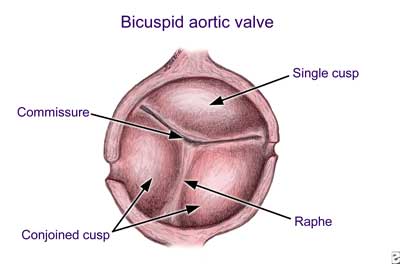What About Bicuspid Aortic Valves In Newborns?
By Adam Pick on March 24, 2008
Like many heart valve surgery patients, I was born with a bicuspid aortic valve. However, unlike many of you, I was not diagnosed with the bicuspid aortic valve defect as a newborn baby. It wasn’t until I was five years old that my family doctor heard my heart murmur. After that, diagnosis of the bicuspid valve was formally issued following my first visit to the cardiologist.
After I had an aortic valve replaced, I was curious to know, “How do bicuspid aortic valves impact newborns?” and “What other problems can bicuspid valves cause in newborns and children?”
I knew that the bicuspid aortic valve occurs when the aortic valve does not develop normally while the baby is in the womb. However, I wanted to know more.

So…. I just did some some quick Google-ing about bicuspid aortic valves in newborns and children. My first stop was the Bicuspid Aortic Foundation. There, I learned:
- Bicuspid aortic valves in newborns is the most common congenital abnormality of the heart.
- Current clinical and scientific studies are revealing that bicuspid aortic valve disease is not a simple valve condition. It increasingly appears to be a genetically based connective tissue disorder.
Then, I went over to The Cleveland Clinic Heart Center website. There are learned some interesting information including:
- Bicuspid aortic valve disease is a congenital condition(present at birth) and occurs in about two percent of all newborn babies.
- Like my story, patients with congenital or bicuspid aortic valve disease often do not require aortic valve surgery until they are adults. Younger patients usually have features of a leaking valve rather than a stenotic valve.
Still, the University of Michigan (my alma mater) had this to say about the impact of BAV in newborns and children, “Children with bicuspid valve are at increased risk for subacute bacterial endocarditis (SBE). This is an infection of the heart caused by bacteria in the blood stream. Children with heart defects are more prone to this problem because of the altered flow of blood through the heart. It can occur after dental work or medical procedures on the GI or respiratory tract because these procedures almost always result in some bacteria entering the blood. SBE can usually be prevented by taking an antibiotic before these procedures.”
Finally, Cedars-Sinai Medical Center answered a lingering question about BAV and aortic aneurysms. Cedars-Sinai notes, “Bicuspid aortic valves and ascending aortic aneurysms often occur in the same person. At one time it was thought that stress on the aortic wall from the abnormal blood flow through the bicuspid valve damaged the aorta, causing it to enlarge. However, in some people the bicuspid aortic valve has been replaced and an aortic aneurysm still developed years later, even though the aorta was no longer subject to the abnormal blood flow pattern. It has been found that the aortic tissue itself may be weak. This weakness is due to connective tissue degeneration in the wall of the aorta, making it prone to aneurysm formation.”
I have to admit, this was pretty interesting to read about considering I had a bicuspid aortic valve, at one time (many years ago) I was a newborn and I did have my bicuspid valve replaced.
Keep on tickin!
Adam
|
Theresa says on March 25th, 2008 at 8:52 am |
|
Adam that was interesting..you answered a question I had been pondering of most recent. If bicuspid valves are replaced and if aortic stenosis pressures are relieved(if only temporarily stretched that is) by valvuloplasty then why is there still a risk of aneurysm with blood flow being normal or near normal..the connective tissue argument then sounds quite likely…interesting…I look forward to reading more of your findings in the future..I am going to bring this up with my sons cardiologist in April. |
 |
|
Theresa says on March 29th, 2008 at 8:33 am |
|
http://jtcs.ctsnetjournals.org/cgi/content/abstract/135/4/901 Is this what you were referencing from…now I am DEFINITELY speaking to my sons pediatric cardiologist about this!!!!!! Theresa |
 |
|
lynn houser says on September 29th, 2008 at 12:38 am |
|
i have a 2 mo old infant that has a bicuspid valve i found this out when she was 2 weeks old, but her dr’s thought it was a heart murmur, it was’nt. |
 |
|
jamie says on July 11th, 2012 at 3:46 pm |
|
I have a nine year old son who has a bicuspid valve and we found this out when he was 3 months old. So we pretty much have known this all his life, my question is his heart doctor says his valve is enlarging. And he is not suppose to do anything stressful or anything that makes him groan is this normal for his situation. |
 |
|
Gemma Wilkie says on December 15th, 2017 at 7:19 pm |
|
I have noticed your comments were from several years ago. Lynn in particular – I have just found out that my 7 month baby boy has a biscupid valve, and the same as you was told he will be fine and to have a check up in a year… how is your daughter? Has she experienced any related problems since? I’m sorry, I’m just trying to get some realistic info that could help me understand what I should be doing/looking for. |
 |













